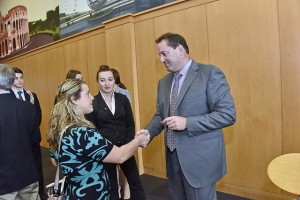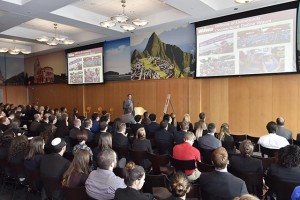A hand in the crowd went up and Chris Gheysens called upon the student in order to field his question. Admittedly, it was a query Gheysens already had heard a number of times.
“And I think you’re the sixth person to ask me that question today,” said Gheysens.

No, a Wawa will not be coming to Temple University’s Main Campus any time soon, Gheysens said. But the chain of convenience stores and gas stations is expanding in ways that excite Gheysens, the President and CEO of Wawa, regarded as one of the nation’s top privately owned companies.
More importantly for Gheysens, who visited Temple Oct. 29 as an Executive in Residence to the School of Tourism and Hospitality Management (STHM), is Wawa’s never-ending pledge to improving the customer-service experience.
Wawa has more than 22,000 associates operating its 665 stores across six states. It’s the No. 7 seller of coffee nationally and it owns the market regionally in sales of both coffee and sandwiches. And yet, there was a time when Wawa was viewed in some parts as “just a gas station,” said Gheysens, who’s been with Wawa in various capacities for more than 17 years.
“Most people would not associate decent, fresh and healthy food offerings with a gas station,” Gheysens said, “but then most people wouldn’t associate a commitment to the customer with a gas station, either.”
Gheysens spoke to a group of more than 200 students and faculty at Alter Hall, as STHM’s final Executive in Residence of the semester. In his 45-minute address, he emphasized a devotion to core values, the maintenance of a desire to serve and a passion for retail.
According to Gheysens, a Philadelphia area native, a bulk of Wawa’s locations are “at the corner of Main Street and Main Street.” He called Wawa the “unofficial town hall in your community,” where people gather to socialize, gas up and grab a bite to eat. And somewhere along the way, the company – which this year celebrated its 50th anniversary – changed the way people view convenience stores.
You can get a cup of coffee just about anywhere, Gheysens said. That’s why he and Wawa are focused on adhering to the company’s six principles, all of which place the consumer and customer service above all else.
“You don’t want to come to work to make coffee,” Gheysens said of Wawa’s employees, “so we attach a higher calling to every position, every day. We have a three-minute window to make someone’s life better and when that happens millions of times a day, we’ve found that you can make a profound impact in your community.”

Gheysens didn’t always envision a career with Wawa, he said. After attaining his Bachelor’s degree from Villanova University, he took a position in auditing practice with Big Four firm Deloitte, in Philadelphia. While there, he received advice from a colleague, who had encouraged him “to become friends with the person who schedules clients,” one of which was Wawa, headquartered in nearby Delaware County, Pennsylvania.
Since 1997, Gheysens has worked for Wawa in accounting, operations, research, human resources and information technology. Less than two years ago, he was appointed the President and CEO – or, in Wawa parlance, their “Lead Goose” – and he’s piloted the company’s expansion into Florida, among other accomplishments. Wawa knows a thing or two about expansion, having evolved from a local dairy farm to a home-delivery service to what it’s best known for today – a chain of convenience stores that ranks among Forbes’ top privately owned companies.
“Everybody knows what is in a Wawa,” said Dr. M. Moshe Porat, Dean of the School of Tourism and Hospitality Management and the Fox School of Business at Temple University. “The power of that brand is simply amazing.”
During his visit, Gheysens engaged in a spirited question-and-answer session with students from both STHM and the Fox School, with STHM Assistant Professor Ira L. Rosen serving as the moderator. That’s when Gheysens, whose company annually sells more than 200 million cups of coffee, took a question about expanding Wawa’s operations to include a Temple location.
“We were delighted to have a high-level executive like Chris speak to our students about Wawa, its tremendous business model and its embrace of core values in its daily operations,” said Dr. Elizabeth Barber, Associate Dean of the School of Tourism and Hospitality Management.
Then, Dr. Barber interjected personal opinion – one that had nothing to do with a certain future location on Temple’s campus.
“Pumpkin-spice coffee is back,” Barber said, smiling, “so thank you, Chris.”